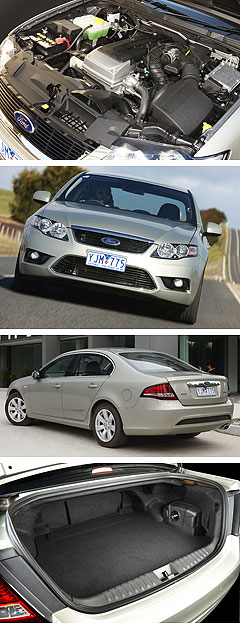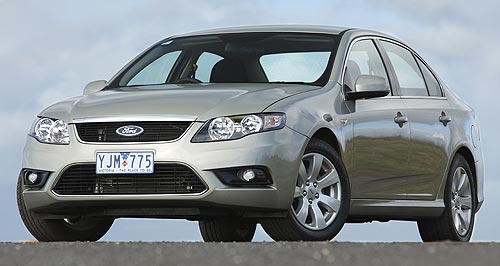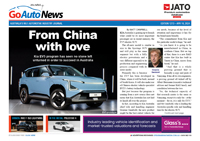Make / Model Search
News - Ford - Falcon - EcoLPiHeat was on Falcon EcoLPiGas heat: Ford's biggest engineering challenge on the Falcon EcoLPi was to address hot weather start-up issues. Ford reveals hot start-up issues proved biggest challenge for new LPG Falcon1 Aug 2011 HOT-WEATHER starting with a wide range in quality of liquefied petroleum gas was the biggest challenge facing Ford Australia’s engineers in developing its latest LPG system for the Falcon. Ford Asia Pacific Africa powertrain engineering manager Pritika Maharaj said there was no way the new LPi Liquid Phase injection and charge-cooled set-up dubbed EcoLPi was going to concede any operational or performance advantages to its Orion inline six-cylinder petrol-powered engine sibling. “It was a ground-up development, and we needed to keep within a pricing structure, but (thermal management) was an area that we had to keep focus on,” she told GoAuto. “We didn’t want any compromises at start-up time, and in Australia you have to accommodate a 100 per cent propane mix to a 40/60 propane/butane mix … so there’s a lot of strategy needed to service the fuel blend that a car can be carrying. “We’re talking about no-compromise performance from minus-10-degree Celsius to 49-degree Celsius temperature ranges in all types of humidity … and the market will absolutely not accept any compromises (in LPG operation).” As an example of the world-class ingenuity of her Geelong-based team, Ms Maharaj nominated the EcoLPi’s new ‘primer’ technology, which ‘wakes’ the system when the car is unlocked and sends the pump and injectors into action the moment the driver’s door is opened for the quickest possible ignition process.  Devised to meet new Euro-IV regulations that came into effect in the middle of last year, the FG Falcon EcoLPi system belatedly replaces the fumigation vapour injection method that was the basis of the preceding E-Gas system that Ford Australia stopped producing in September 2010. Devised to meet new Euro-IV regulations that came into effect in the middle of last year, the FG Falcon EcoLPi system belatedly replaces the fumigation vapour injection method that was the basis of the preceding E-Gas system that Ford Australia stopped producing in September 2010.Mass production commences next month after a development program of more than two years, which saw over 550,000km of testing around Australia. Ford engine management expert Simon Flint said the boffins at Ford’s engine plant in Geelong were kept hard at work by the level of change needed from E-gas to make EcoLPi the world’s most advanced LPG system available in a mass-produced vehicle. “It really is a new technology because it is a single-fuel application,” said Mr Flint. “Everything has been challenging, but it has really been about the application of the LPi system itself – the integration of the new pump and tank, fuel rails, injectors, that sort of thing. “Overall, it was the biggest challenge but also the one we loved the most. We always relish the opportunity to develop something new.” Mr Flint explained that avoiding vaporisation from when the liquid enters the tank to the point of combustion in a climate like Australia’s was always going to be a formidable obstacle. “The thermal management of the fuel was a big one – during hot starts especially. “The 30-bar injection pressure (we developed as a result) is the highest general system pressure that we have ever worked with … for a multi-point port fuel-injected engine, this is considered to be very high pressure. “You have to keep in mind with LPG that the system pressure varies significantly with the composition of the LPG temperature … on a 14-degree Celsius day, for example, the fuel rail is probably running at 12 to 14 bar, while in the heat of the outback with the car towing a trailer it would be running close to 30 bar.” All options were looked at when Ford embarked on its new-generation LPG system back in early 2009, including the development of the fumigation vapour-injection method that was the basis of the EcoLPi’s E-Gas predecessor in previous LPG Falcons, in both single and dual-fuel applications. “We looked at everything, to see if we could get the fumigation system through, and whether it was realistic to enter into that exercise,” said Mr Flint. “But it wasn’t just about getting to Euro-IV (that we went to LPi) it was also the want of giving the customer transparency to petrol. We wanted to get the most out of the car. “And as far as going dual fuel with LPi … we didn’t want to pass on cost and complexity to the consumer.” Mr Flint said the Geelong engineering team’s talent and natural enthusiasm made overcoming the issues much easier. “We’ve been very proud with what we’ve been able to achieve – the passion that our people have demonstrated. “While nothing ended up being insurmountable, I can assure you there were plenty of late nights.”  Read more |
Click to shareFord articlesMotor industry news |











Facebook Twitter Instagram